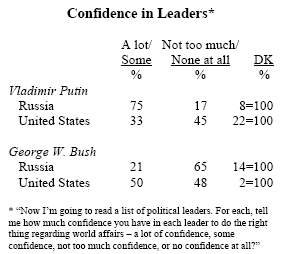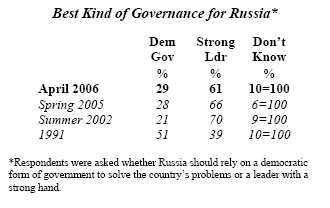by Richard Morin, Pew Global Attitudes Project and Nilanthi Samaranayake, Pew Research Center for the People & the Press
Is Vladimir Putin a new breed of postmodern, post-communist populist or an old-style dictator in democratic clothing? It’s a question currently being debated with even more urgency as the investigation widens into the bizarre poisoning of Alexander Litvinenko, a former Soviet spy and outspoken critic of the Russian president.
Despite shared concerns about terrorism, Putin is increasingly denounced in the West as a power-hungry autocrat. For much of the year, the Bush Administration as well as British Prime Minister Tony Blair and other Western leaders have decried what they see as ongoing efforts by Putin to consolidate power and roll back democratic reforms.
But in Russia, Putin continues to be extraordinarily popular — even among Russians who express democratic leanings, according to surveys by the Pew Research Center and others.

Overall, three in four Russians (75%) expressed confidence in Putin to do the right thing in world affairs, according to a Pew Global Attitudes Survey conducted in April of this year. Surveys conducted this year by Russian pollsters put his overall job approval just as high. Moreover, large majorities — more than six in 10 — in each of the country’s major political parties expressed confidence in Putin, the Pew survey found.
Putin retains broad popularity despite continuing economic troubles and the ongoing confrontation with rebels in Chechnya. Instead, evidence is mounting that it is democracy that has suffered a loss in public esteem as the result of the chronic economic and social problems that plague Russia.
In the most recent Global Attitudes poll, 6-in-10 Russians said they would prefer that Russia were led by a leader with a “strong hand,” while 3 in 10 preferred democratically elected leaders to govern the country. That’s a dramatic reversal from the heady days of the declining Soviet empire; the 1991 Pulse of Europe survey found that 51% preferred democracy and 39% felt more comfortable if the country were in the hands of a strong leader.
Putin himself seems to share this dissatisfaction with democracy. In the past two years, election rules have been repeatedly rewritten to prevent unwanted political challenges to Putin’s rule, Masha Lipman of the Carnegie Moscow Center wrote earlier this month in the Washington Post. “One recent initiative has been to abolish mayoral elections. With gubernatorial elections already replaced by Kremlin appointments, this is a logical next step in the dismantling of representative democracy,” she predicted.
Despite howls of criticism from the West when Putin strays from a democratic course, there’s scant evidence that the Russian leader is paying a significant price internally. If anything, he is more popular with Russians who express democratic leanings than with those who yearn for the days when Russia was ruled with a strong and sometimes bloody hand.

Among the 29% who supported democracy, 8-in-10 Russians (81%) expressed confidence in Putin to handle world affairs, according to the Pew survey last spring. Among the majority who preferred “a leader with a strong hand” to be in charge, 72% held a favorable view of the Russian president. (That’s not to say Russians are entirely sanguine about the political direction of the country under Putin: 46% of those surveyed last month by the Yuri Levada Analytical Center said they were at least somewhat worried that their president “might try to establish a severe dictatorship, relying on the security forces.”)
One reason may be that Putin has proven to be a master at mixing what his harshest critics see as old-style Soviet repressiveness with the trappings and techniques of 21st Century populism. He has conducted five annual question-and-answer events with the Russian public through live-hookup, telephone, email and text messaging. Usually lasting several hours, the call-ins allow Russian citizens to ask the president questions about his policies and voice their concerns, while giving Putin the opportunity to show he is responding to voters’ concerns.
At the beginning of Bush’s recent trip abroad, the American president met his Russian counterpart in Hanoi — an exchange notable, in part, because of the contrast between the standing of the two leaders with their respective publics. Bush is far less popular with Americans than Putin is in his home country. In April, Bush’s job approval rating stood at 35% — less than half the support that his Russian counterpart enjoyed in his country at the time.
Moreover, recent polls suggest that Putin has retained his popularity while Bush’s standing with the American public has remained weak. The November survey by the Levada Center found that 80% of those interviewed said they approved of Putin’s performance — greater than the 71% who voted to re-elect him two years ago. Other recent surveys in Russia confirm Putin’s enduring standing with his people.
In contrast, the latest Pew survey conducted after the November elections found Bush’s job approval rating at 32%, the lowest of his presidency and fully 20 points below his share of the 2004 presidential vote. Among Republicans, three in four approved of the job Bush was doing. But unlike Putin, Bush is deeply disliked outside his own party: 9% of all Democrats and 24% of all self-described political independents approved of Bush.
No evidence linking Putin to Litvinenko’s death by polonium poisoning has emerged — other than the former KGB agent’s deathbed declaration that his blood was on Putin’s hands. Nor has blame been affixed in the case of journalist Anna Politkovskaya, a leading Putin critic, who was gunned down in the lobby of her apartment building in October. Twelve journalists have been killed since Putin came to power in 2000, and most of the cases remain unsolved.
Together the incidents have fed rising fears in the West about Putin’s increasingly autocratic rule at a time when Bush and other Western leaders say they are counting on Putin to help address the nuclear threats posed by Iran and North Korea. The Pew survey suggests the broad challenges that Western leaders face as they attempt to balance efforts to get Putin to reverse his anti-democratic course while also enlisting his help in dealing with Iran and North Korea. This tricky balancing act was on public display this week in Paris as diplomats from the United States, Britain, France, China, Germany and Russia met to discuss imposing penalties on Iran for refusing to stop uranium enrichment.

As with their attitudes toward Putin, Russians view Iran and North Korea with considerably less alarm than do Bush and the American public. Barely a third of the Russian people (35%) say the current government of North Korea is a danger to regional peace compared with 7-in-10 Americans, according to the Pew poll. Barely half (52%) of all Russians identified Iran as a danger compared with 8-in-10 Americans. Significantly, Russians were far more likely to see American presence in Iraq as a threat to stability in the Middle East than to see Iran or North Korea as dangers.
Still, the survey suggested that moves by the West to rein in Iran’s nuclear capability may find support among the Russian people — should Putin decide to cooperate. Eight-in-10 Russians opposed Iran acquiring nuclear weapons, though they viewed the nature of the Iran threat very differently than do Western publics. While the Russian people were divided over whether a nuclear-armed Iran would attack the United States or Europe, or provide such weapons to terrorist groups, a strong majority (72%) said it was likely they would use them only for defensive purposes.




